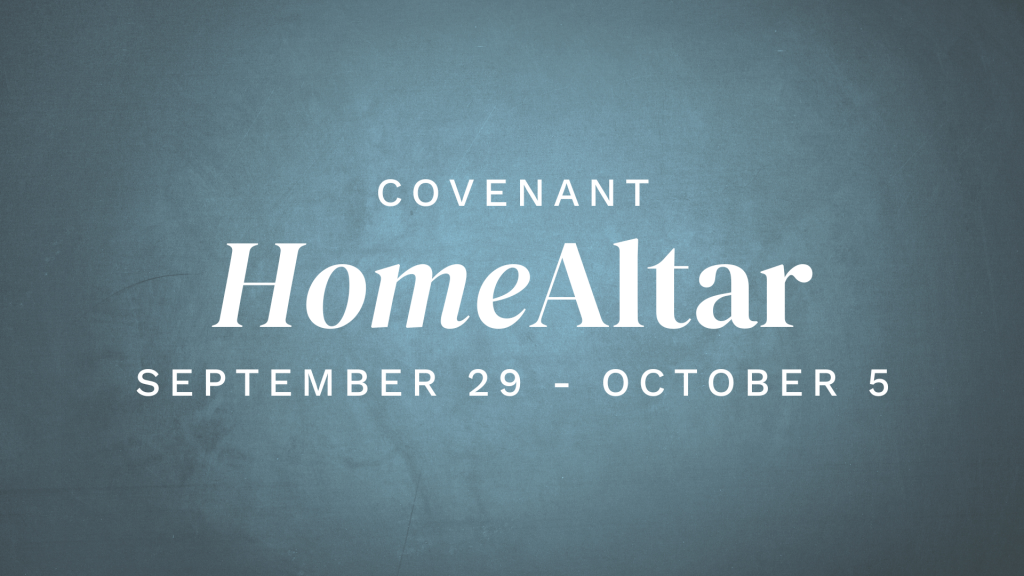
What If…?
Sunday, September 29
Psalm 124
It is said that the only thing we are more conditioned to answer than the phone is a question. This psalm starts with a great one: “What if the Lord had not been on our side?” (v. 1, NLT). I particularly like Charles Spurgeon’s translation: “Had it not been Jehovah! He was for us, O let Israel say! Had it not been Jehovah! He who was for us when men rose against us!”
David wrote this psalm for pilgrims heading to Jerusalem, a meditation to prepare their minds and hearts to worship God in his holy city. Based on Old Testament narratives, the Israelites tended to overlook the troubles God had saved them from and the many blessings he had poured over them.
It’s a great question for us to reflect on also. What has the Lord
saved you from? How has the trajectory of your life changed? What
if he hadn’t saved you?
Lord, thank you for pulling us out of the muck and the mire. Thank you that we can trust in you, our fortress in times of trouble. Amen.
Enough
Monday, September 30
Genesis 1:29-30
Evangelist George Müller prayed, thanking God for what he and 300 orphans were about to eat; but there was no food. Then a baker stopped with bread enough for all. Then another knock. A milkman’s cart had broken down; did they want the milk so it didn’t spoil? Not only did they have bread, but it was fresh bread! Not only milk, but fresh milk! Müller wrote, “The Lord not only gives as much as is absolutely necessary for his work, but he gives abundantly.”
Genesis 1:29-30 uses words like “every” and “all” to describe what God has given us. The Lord operates from a place of abundance. He owns everything and willingly shares it with us (Deuteronomy 10:14).
And he doesn’t just want us to have a new life in Christ; he wants us to have “a rich and satisfying life” (John 10:10, NLT)!
Lord, you tell us that you will supply all our needs (Philippians 4:19). Help me to seek you in times of need, to trust you to provide abundantly, and to thank you when you answer. Amen.
Sharing the Load
Tuesday, October 1
Numbers 11:4-6, 10-18
A burden shared is a burden halved. A problem doesn’t seem so heavy when you can talk it over with someone. The Lord seems to take this proverb literally in this passage. When the Israelites were whining in the desert (again), Moses dramatically exclaimed to God, “I can’t carry all these people by myself! The load is far too heavy! If this is how you intend to treat me, just go ahead and kill me. Do me a favor and spare me this misery!” (vv. 14-15, NLT).
Instead of chastising Moses, God graciously provides 70 leaders to share the burden of those two million people.
God also commands us to bear one another’s burdens (Galatians 6:2). That requires us to be willing to help lighten our brother’s or sister’s load in a physical, mental, or spiritual sense. It also requires us to be humble enough to accept help when we are overwhelmed or stumbling.
Lord, thank you for your provision when life or temptation is too much. Open my eyes to see which burdens, others’ or mine, need to be shared. Amen.
Trust and Obey
Wednesday, October 2
Ether 3:5-6; 7:1-6, 9-10; 9:20-22
When God calls us to do something, he wants us to follow through and do it.
In Esther, we see a young woman who already has gone through so many trials—she was exiled, orphaned, forced into the king’s harem—when her cousin Mordecai asks her to go through yet one more. Would she risk her life and speak to the king on behalf of her people the Jews? Mordecai tells her that if she doesn’t speak up, the Jews will still be delivered somehow, but Esther and her family will die. “Who knows if perhaps you were made queen for just such a time as this?” (4:14, NLT).
When God tells you to do something, do you obey immediately and with a good attitude?
Lord, we know that those who hear your word and do it are blessed (Luke 11:28). Please help me obey you the first time you call—and with a willing spirit. Amen.
Greater than the Angels
Thursday, October 3
Hebrews 1:1-4
In the Old Testament, we see many different ways that God spoke to his prophets (e.g., a burning bush; a still, small voice; a donkey; visions) and the many ways God’s prophets spoke to the people (e.g., while bound in ropes, with a ruined waistband, while lying on one side for a year).
Hebrews begins with a proclamation that God has now spoken to us through his Son who is far greater than the angels. The writer wants to impress upon us how big this news is! He describes Jesus with phrases like “radiates God’s own glory,” “expresses the very character of God,” and “sustains everything by the might power of his command” (v. 3, NLT).
No longer do we have to hear from God or speak to God through an intermediary. We get to go directly to the source! Hallelujah!
Lord, thank you for the privilege and honor we have to speak to you directly! And thank you for the Scriptures, yet another way you speak to us. Amen.
Fully God, Fully Man
Friday, October 4
Hebrews 2:5-12
In Hebrews 1, the writer highlights how Jesus is fully God. The readers of that day had no trouble believing that. It is our generation that finds this difficult.
In chapter 2, the writer lays out an argument for how Jesus was also fully human. This is what the ancients had a hard time grasping.
The writer points out that at creation all things were put under the authority of humans (v. 8). Yet in 1:2, we read, “God promised everything to the Son as an inheritance” (NLT). So in order to claim his inheritance, Jesus had to become human. Because our sin separated us from God, Jesus had to experience death. It is this humanity that allows us to be his co-heirs, his brothers and sisters through faith. I love how the writer phrases it: “Jesus and the ones he makes holy have the same Father” (v. 11).
Father, thank you for the incomparable gift of salvation! Jesus, thank you for the sacrifice you made for me. Amen.
Endurance, Prayer, and Restoration
Saturday, October 5
James 5:10-20
The concluding verses of the book of James covers a lot of territory. For those who are suffering, James offers encouragement, reminding us that the Lord blessed Job at the end of his struggles. Then he exhorts us to prayer and praise, which hold a lot of power if offered in faith. Next, we are to hold each other accountable by confessing our sins to one another and praying for one another because “the earnest prayer of a righteous person has great power and produces wonderful results” (v. 16, NLT).
The closing verses echoes truths from Tuesday—we are called to shoulder one another’s burdens, especially as relates to the faith. If we can draw someone back to Christ after they have drifted away, we should celebrate because we will surely “save that person from death and bring about the forgiveness of many sins!” (v. 20, NLT).
Lord, thank you that we don’t walk this road of faith alone. Thank you that we can call on you and lean on you and others whom you have drawn to yourself. Amen.








